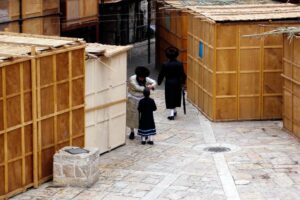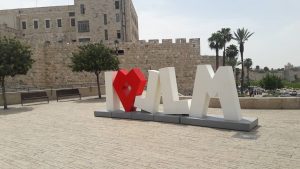Israeli Jews are a blend of different ethnic Jewish groups. Essentially all Jews in Israel identify themselves with one of four major religious subgroups: Hiloni or “secular”, Masorti or “traditional”, Dati or “religious”, and Haredi or “ultra-Orthodox”.

Hilonim are the slightest religious, and they form approximately half of Israeli Jews, i.e. 49%.
Generally, Datiim, who sometimes are named Modern Orthodox Jews, follow Jewish traditions and keep Shabbat typically. However, they are more integrated into modern society than Haredim and tend to favour a political view, especially regarding the conflict with the Palestinians.
Masortim belong to the religious middle ground, but they appear to be decreasing among the Israeli Jews, whilst the Haredi community is growing with a current 9% of the total Jewish population.

Jewish groups constantly differ on a series of particular public policy matters: the more religiously observant Jews require that Israel should avoid public transports on Shabbat; on the contrary, secular Jews entirely demand that public transports should work on Shabbat.
Jews of different stages of religious practice also take completely different positions regarding some critical aspects of the Jewish state. For example, in a hypothetical conflict between democratic laws and Jewish law, which is well-known as halakha, ultra-Orthodox Jews are convinced that the Jewish law should be respected as the essential principle in Judaism. In contrast, an equivalently considerable number of secular Jews claims that democratic ideals should have precedence.
Religious contrasts of Jerusalem
Jerusalem is well-known as a religious city by tradition, with a big Haredi community, which opposes the government regarding religious affairs such as conversions and kashrut. In general, the atmosphere of Jerusalem is pretty different from the Tel Aviv one. Because of the particular topology of Jerusalem, religious and secular areas of Jerusalem are very connected. Especially in the summertime, it is easy for a secular Jew to be concerned to enter a very Haredi neighbourhood like Mea Shearim and get banned from walking there. Indeed, in such religious areas of Jerusalem centre, it is strictly forbidden to walk wearing improper and unmodest clothes, for both women and men. Hence, non-religious Jews and visitors should mind their clothing habits before access certain neighbourhoods, making a walk in the Jerusalem a bit challenging.

Nevertheless, there are many neighbourhoods where the atmosphere is tolerant and open-minded, in the same way, you would find in Tel Aviv.

It is recommended to know in advance which areas to walk to, and in case you want to visit the Haredi districts of Jerusalem, please keep in mind that it is important to walk there modestly dressed.
Jerusalem is the biggest city and the capital of Israel, with an area of 126 square kilometres. Hence, Jerusalem is the most populous city of Israel, with a total population of almost one million. Most of Jerusalem population is Jewish, and among them, the ultra-orthodox population, i.e. Haredim, is made of 220 thousand residents, forming 25% of Israel ultra-orthodox population.

The city of Jerusalem is the most variegated and diverse one of all Israel’s cities. 60% of Jerusalem total population lives in East Jerusalem, and 40% resides in West Jerusalem. East Jerusalem is a blend of 40% Jews and 60% Arabs, while West Jerusalem counts 99% Jewish population.
In the end, Jerusalem is one of the most beautiful, enchanting and fascinating cities in the world and it is more than suggested to visit it at least for a week.



